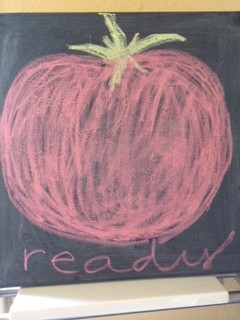 Harvest time is coming. The tomatoes, beans, zucchini and cukes are ready, and I have to pick them and do something with them – can them, freeze them, cook with them. I’ve been researching harvest traditions for the first Folklore in a Box, on sale in a mid-August (more on that very soon). Harvest traditions often include hard work that is also a party. Canning parties are like this. They are really fun, and they are also hot, long and tiring depending on how much you can. We’ve canned tomatoes and peaches the last couple of years at our house and plan on doing it again next week. With all the heat we’ve had this summer in the Northwest, I’m looking at the weather forecast to find a time to do it in my not-at-all air-conditioned kitchen. I’m really looking forward to getting together with my friends, getting out in the peach trees and eating yummy peaches. Canning fruit is a harvest tradition we’ve started to love.
Harvest time is coming. The tomatoes, beans, zucchini and cukes are ready, and I have to pick them and do something with them – can them, freeze them, cook with them. I’ve been researching harvest traditions for the first Folklore in a Box, on sale in a mid-August (more on that very soon). Harvest traditions often include hard work that is also a party. Canning parties are like this. They are really fun, and they are also hot, long and tiring depending on how much you can. We’ve canned tomatoes and peaches the last couple of years at our house and plan on doing it again next week. With all the heat we’ve had this summer in the Northwest, I’m looking at the weather forecast to find a time to do it in my not-at-all air-conditioned kitchen. I’m really looking forward to getting together with my friends, getting out in the peach trees and eating yummy peaches. Canning fruit is a harvest tradition we’ve started to love.
In my research, I read an excerpt from a book by Parker Palmer, in an anthology by Paul Rogat Loeb, called The Impossible Will Take a Little While. Love that title! It comes from a lyric by the wonderful Billie Holiday, “The difficult I do right now. The impossible may take a little while” (quoted in Loeb, 4). The book is a series of essays on perserverance and hope for human peace and justice by those, well known and not, who have given much of their lives for the fight. Very inspiring! The essay by Palmer is about accepting that there are seasons, and that the work for change, whether personal or social, doesn’t have to proceed in a straight line for it to be happening. We can find hope and the will to continue on when we look back at all that was accomplished in terms of human rights in the twentieth century. We see that sometimes seeds were planted through huge labor and sometimes incredible suffering. And that, like a tomato dropped in the dirt, or peaches put up for winter, sometimes the seeds did not bear immediate fruit, but much later, or a little while later, they did. Freedoms were granted, hearts were changed, rights were won seemingly easily. But so much work had been done without showing progress earlier. Palmer writes about seasons, how we fight them, and it causes despair.
So many of our metaphors are industrial. We imagine we can buy or order change, and when we can’t, we are disheartened. We make a living, rather than grow it. The harvest traditions I’ll explore over the next couple months don’t fight the seasons, but celebrate and move with them. These quiet traditions, gathering, canning the harvest, festivals, dancing, working together, forming the communities of need and making food and crafts may not seem to do much or mean much when we lay them out against all the media noise, how much needs to be done, purchased and accomplished. But I found it inspiring to look at work as seeds. And if they are lovingly tended, even if they don’t grow into change right now, they might later. They might not. We won’t know. So we have to make joyfully, and do the work as if they will. That’s what our heroes did. Lucky for us.

